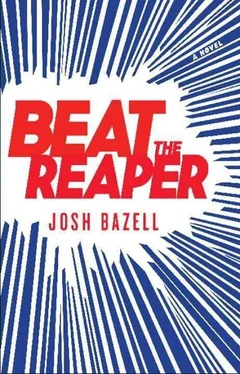“It’s Dr. Brown,” I say. “Your patient’s almost prepped.”
“I thought you said he was prepped,” Friendly says, when he finally shows up. Stacey comes in behind him, sheepish in her own mask and cap. Friendly has his hands up, soaking wet, with the backs facing forward.
Squillante is prepped. He’s just not draped.
Draping is when you cover everything but the precise area you’re operating on. Most surgeons want to be there when it happens, so that the patient doesn’t turn out to be, say, face down by mistake.
Then again, most surgeons don’t wear knee-high rubber boots to a gastrectomy, like Friendly is wearing. It can’t be a good sign.
Washing your hands, by the way, which Friendly has just done and which I did forty-five minutes ago, is the best part of surgery. You do it in the hallway, smacking the front of the steel sink with your hip to turn the faucet on. Despite the frigidity of the air, perfectly hot water comes out. You peel open a presoaked sponge pack that you get from the dispenser (presoaked in either iodine or an eight-syllable synthetic sterilizer made by Martin-Whiting Aldomed—your choice, though iodine smells better) then wash the shit out of your hands, including under your nails. You always wash upwards, from the fingertips to the elbows, making sure no water runs back down toward your fingertips. You’re supposed to do it for five minutes. You do it for three, which feels like a vacation, then bang the water off. The sponge you just drop in the sink. Cause you are done doing anything menial for the next few hours.
Right now, the five of us in the room who are “scrubbed in”—Dr. Friendly, the scrub nurse, the instruments nurse, my med student, and I—literally can’t scratch our own asses. In fact, we can’t pass our hands above our neck or below our waists, or touch anything that isn’t blue. [35] This brings up an obvious paradox, which is that everything blue in an OR is supposed to have been sterilized, but our scrub suits, which are blue, have all been in at least one fast-food restaurant since the last time they were washed. What can I say? It’s an imperfect science.
Dr. Friendly dries his hands on a blue towel, then does the little dance where you plunge your arms into the paper gown the scrub nurse holds out, then into the gloves, and then you tear the cardboard card off the front of your gown (touching only the blue half) and hand it to the circulating nurse, who holds it while you spin around once, so that the belt of your gown tears loose and you can tie it. Friendly does his best to look bored during this, but I don’t buy it. It probably never gets old.
“I’ll take chain,” he announces. The instruments nurse opens a pair of chain-mail gloves and drops them onto the scrub nurse’s large blue table, where Friendly picks them up himself and puts them on over his rubber ones.
He clanks his fingertips together. “Now another pair of Dermagels.” He winks at me. “HIV risk. The patient was wearing a pinkie ring. And in my book, gay gets you the chain mail.”
The scrub nurse, a small Filipino man, rolls his eyes.
“Oh, what?” Friendly says. “You’re offended? I can’t say the word ‘gay’? Worry about that on your own time. Let’s work.” To the circulating nurse he says, “Music, please, Constance.”
The circulating nurse goes over to the boom box on one of the carts, and shortly afterwards that U2 song comes on about how Martin Luther King was shot in the early morning of April fourth. Martin Luther King was shot in the evening, even if you’re on Dublin time, but the U2 greatest-hits album is something you learn to live with in medicine. Every white surgeon over forty plays it. You learn to be grateful it’s not Coldplay.
The scrub nurse and I unfold a blue paper sheet over Squillante and tear out the section above his abdomen. Then we drop a square of iodine-perfused polymer onto the revealed skin. It fuses to Squillante’s wrinkles.
Friendly, meanwhile, wanders around with a stapler, stapling the paper sheet to Squillante’s skin. Stapling is pretty shocking the first time you see it. But the damage it does is minor compared to the damage from the surgery, and the old-schoolers swear by it. So people who want to act like the old-schoolers swear by it too.
As Friendly’s finishing up, my other med student comes into the room and whispers “The LD 50of defenestration is five stories, sir.”
To review, “LD” is “lethal dose,” and the LD50 is the lethal dose for 50 percent of people. Defenestration is being thrown out a window. So the student is telling me that if you throw a hundred people out a fifth-floor window, half of them will live.
“Jesus fuck,” I say. I threw Skinflick out a sixth -story window. What does that make the odds?
And why can’t I catch a break? “What’s the usual cause of death?” I say.
“Aortic rupture,” the med student says.
“Okay.” The aorta, our largest artery, is essentially a long thin balloon, like the ones pedophiles twist into the shapes of animals. [36] Apparently they’re hoping the squeaking noise will drive away the parents.
Since it’s filled with blood, it makes sense that it would burst on impact. “What’s next?” I say.
“Head injury, then bleed-out from organ laceration,” the med student says.
“Good work,” I say.
My mouth fills up with bile as I think about it. Although my mouth has been filling with bile regularly since I ate my last four Moxfanes half an hour ago. At least I’m alert.
“Labs from the needle stick aren’t back yet, sir,” the med student says.
“Don’t worry about it,” I say. True, my forearm is throbbing, but Assman’s sample has probably long since been thrown out. If it ever got sent in the first place. Too many people’s workday would be lengthened by five minutes if it survived.
“Let’s do this,” Friendly says. He kicks a metal step stool into place on Squillante’s right and gets on it. The scrubbed-in med student kicks a stool into place farther down. I go to Squillante’s left side. The instruments nurse is already on a stool by the head, with his trays in place on their various booms.
“Okay, everybody,” Friendly says. “The patient is PMS. I know we’d all like to treat him specially because of that, like he’s a cop and we work at a drive-through. But we don’t work at a drive-through. So let’s be professionals.”
“What do you mean by ‘PMS?’” my med student asks.
“Post–Malpractice Suit,” Friendly says. “Settled a claim nine years ago.” [37] People think (and their attorneys often encourage them to think) that a malpractice suit is a no-risk proposition because 90 percent get settled prior to trial. But you can’t just a malpractice suit. In most states the statute of limitations on personal injury is so tight (two and a half years in New York) that no insurance company will take you seriously until you actually file a claim and agree to deposition. And at that point you’re marked for life—either as a litigious, possibly fraudulent complainer, or (of even more interest to employers, who are the primary consumers of this kind of data) as actually having ongoing health problems.
I’m thankful my student asked, since I didn’t know what Friendly was talking about either. But I’m distracted. The Moxfane has just given me the weirdest feeling. Like I just lost consciousness, but only for a thousandth of a second.
“Signor?” Friendly says.
I shake the sensation off.
“Pen,” I say.
An instant later there’s a pen with the cap off in my hand. I’m not sure if the scrub nurse just uncapped it and handed it to the instruments nurse incredibly quickly, or whether I blacked out again for a moment. Either way, it’s creepy.
Читать дальше










